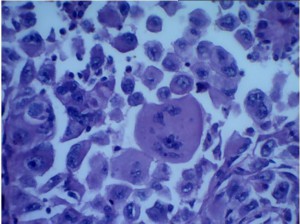Unique approach can be utilized in peptide research. In fact, researchers have constructed a large random library by phage display technology, and wherein each phage clone expresses a unique polypeptide, which has been used in the treatment of eight cell lines of non-small cell lung cancer (NSCLC). Specifically, the key to this study is that researchers only amplify and sequence phages in the cell lysates, trying to screen those polypeptides that are capable of being connected to cell surface and then getting internalized.
 Researchers have indicated the advantage of this program is that one doesn’t need to use imaging to determine the internalization of the molecule. Finally, the researchers found eleven polypeptides that are most likely to bind NSCLC cells and other cancer cells together, whose affinity can be compared with a monoclonal antibody. Surprisingly, although the non-cancerous cells are not screened, these polypeptides can distinguish cancer and non-cancer cells very well. However, researchers do not know where these specificity of polypeptides come from. More efforts are required in the tumor research, in terms of peptide effects.
Researchers have indicated the advantage of this program is that one doesn’t need to use imaging to determine the internalization of the molecule. Finally, the researchers found eleven polypeptides that are most likely to bind NSCLC cells and other cancer cells together, whose affinity can be compared with a monoclonal antibody. Surprisingly, although the non-cancerous cells are not screened, these polypeptides can distinguish cancer and non-cancer cells very well. However, researchers do not know where these specificity of polypeptides come from. More efforts are required in the tumor research, in terms of peptide effects.
Actually, after verifying the specificity and affinity of these peptides, researchers begin to add a variety of chemical and biological molecules to the polypeptide. However, the behaviors of these polypeptides haven’t changed after they are attached with molecules. For example, some researchers attach copper-64 radionuclide to the polypeptide and conduct PET imaging inside the active objects. They have noted that this would be a valuable tool for the detection of metastatic sites because it’s often too difficult to detect the metastases by conventional methods. Currently, they are developing the best polypeptide drug to deliver the drugs and they have successfully delivered doxorubicin and paclitaxel into the tumor cells so far. But whether the antibody or the polypeptide, drugs should be released to reach the lysosomes, because only in this way can the drugs be activated.
More specifically, polypeptide is easy to be cleaned by kidney after entering the body. Thus, maintaining polypeptide’s ability in recognizing and binding tumor is extremely important. Research community is trying to make the achievement into clinical trials as soon as possible.